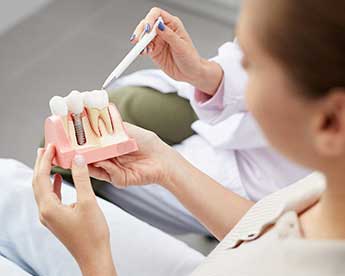Dental implants are often marketed as a long-term solution for missing teeth, and while they are designed to last for many years, the question of whether they will ever need to be replaced is one that patients often ask. The answer isn’t a simple yes or no—it depends on several factors, including how well you care for your implants, your overall oral health, and the materials used in the procedure.
The implant itself, which is a titanium post surgically placed into the jawbone, is intended to be permanent. Titanium is biocompatible, meaning it integrates with your bone through a process called osseointegration, which helps create a strong, stable foundation. In most cases, if the implant is properly placed and you maintain good oral hygiene, the post can last a lifetime. However, the crown—the visible part of the implant—may need to be replaced after some time. Crowns are typically made from durable materials like porcelain or zirconia, but even these materials can wear down after years of daily use. Most crowns last between 10 to 15 years, depending on factors like your biting force, diet, and oral care habits.
Another factor to consider is the health of your gums and surrounding bone. While the implant itself doesn’t decay, the tissue around it can still be affected by issues like peri-implantitis, which is an infection similar to gum disease. This can weaken the bone around the implant and may require treatment or, in severe cases, implant replacement. Maintaining excellent oral hygiene, regular dental check-ups, and avoiding habits like smoking can significantly reduce the risk of complications that might necessitate implant replacement.
In rare cases, an implant may fail to properly fuse with the bone, particularly if there is insufficient bone density or if the patient has underlying health issues that affect healing. If this happens, the implant may need to be removed and replaced after a period of healing. This is why it’s crucial to consult with a skilled dental specialist who can thoroughly evaluate your oral health before the implant procedure to minimize any risks.
In short, while the dental implant post is designed to last a lifetime, the crown may need replacement after several years. Taking good care of your oral health, having regular dental visits, and promptly addressing any issues with the surrounding gums or bone will ensure your implants stay healthy for as long as possible.
Schedule Your Dental Implant Consultation
At New You Dental Center, we ensure a high success rate for your dental implant. Our procedure begins with a consultation to evaluate your dental health and create a personalized treatment plan. During the implant placement, a titanium post is anchored into the jawbone to act as a stable foundation for your new tooth. Once the post has fully integrated with the bone, a custom-made crown is placed, restoring both function and aesthetics.
- Dental Implants in Auburn Hills, MI
- Dental Implants in Flint, MI
- Dental Implants in Lansing, MI
- Dental Implants in Livonia, MI
- Dental Implants in Southfield, MI
